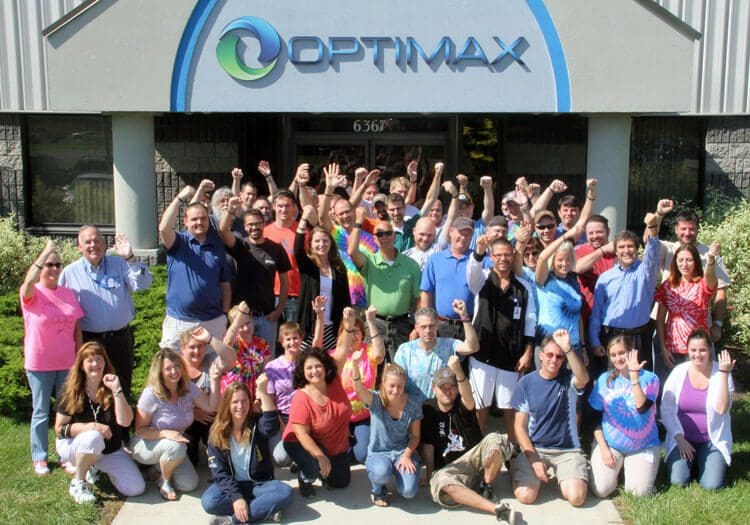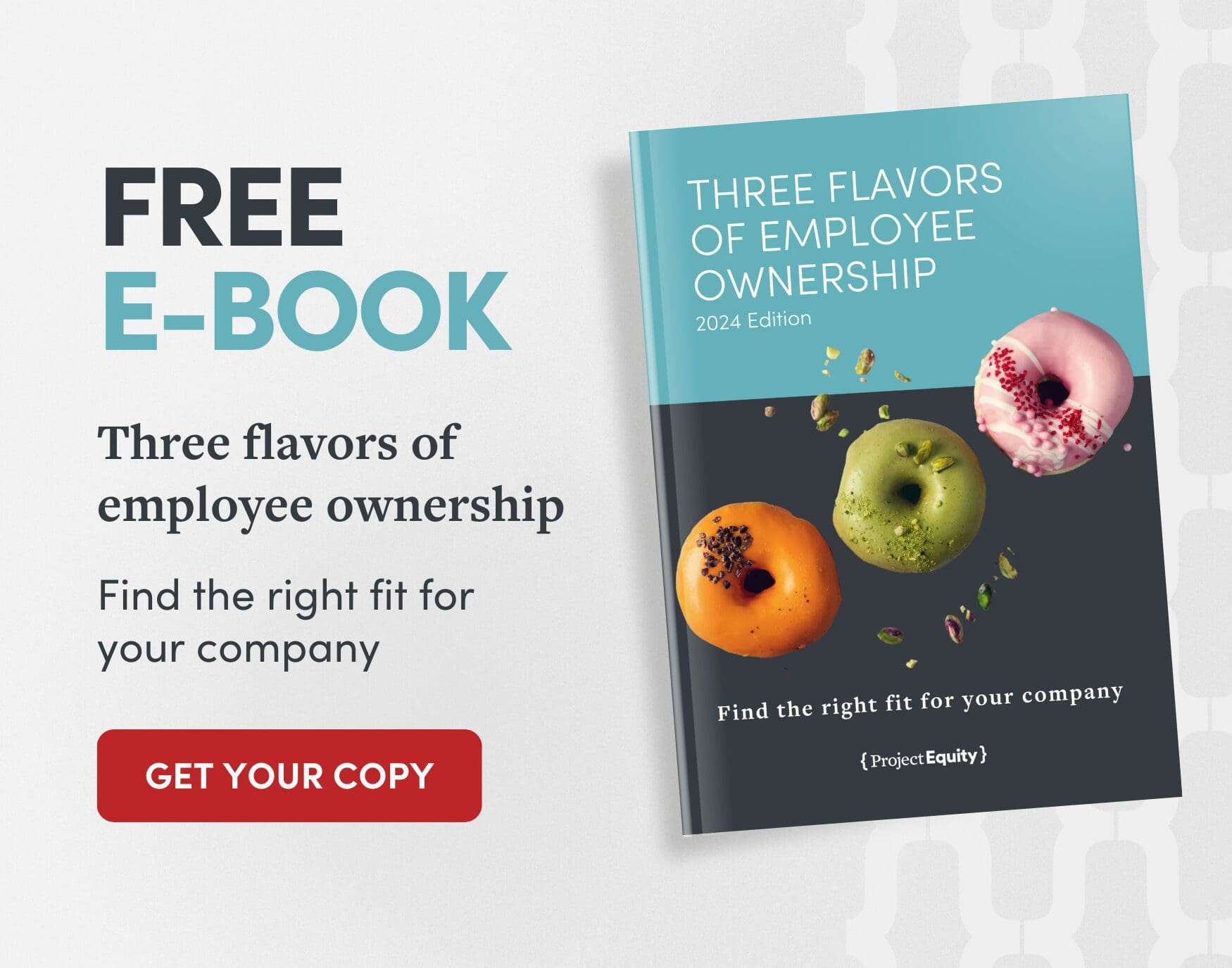Optimax: An Employee Ownership Trust
- New York
The Rochester, New York area has been home to many influential companies, including Bausch & Lomb, Eastman Kodak, Xerox, and Wegmans Food Markets. These companies hire hundreds of people each year and make an impact on their local economy. Now, all eyes are on Optimax.
Optimax is a precision optics manufacturer that has pioneered significant advances in precision optics manufacturing for technologies as diverse as telecommunications, semiconductors, digital photography, displays and diagnostic medicine. They have been in business since 1991 and employ about 400 people in the Rochester area. “In a very small way, we’re carrying on that legacy of Bausch & Lomb and Kodak,” said Rick Plympton, CEO of Optimax. “We’ve worked with NASA and other terrific companies, developing the optics that go into a wide variety of commercial and defense applications—including optics for each of the Mars rovers and camera systems for autonomous vehicles.”
In 2020, Optimax turned the page to its next exciting chapter by becoming an Employee Ownership Trust (EOT).
“What typically happens is that a technology company like ours will get bought by some multinational organization and all kinds of stuff can change. But our customers can rest assured that Optimax is never going to be sold.
Rick Plympton
CEO of Optimax
Transitioning to an EOT
For its first 29 years in business, Optimax was a small for-profit business focused on growing their company and building a culture of teamwork and learning. In the most recent five years, Plympton and his business partner, Mike Mandina, determined to take the steps of developing a business succession plan.
After looking at a leveraged management buyout by selling to their current younger leadership team, they determined it was not the right path. “We could have made that happen,” added Plympton. “But the problem is 20 to 25 years from now, when they’re ready to retire, the business would be worth so much, there’s no way they could parlay it one more time and keep everything here in the community. The business would be so valuable, they’d have to sell it. So it wouldn’t work.
“By far, the easiest thing for a small business owner to do is to clean up their finances and sell to the highest bidder,” continued Plympton. “And for many business owners, that’s also how they’re going to get their biggest payout. That didn’t fulfill what we wanted to do with Optimax.” Optimax is a company built with people and culture as core foundations. The goal they cared about the most was to continue to create jobs in the Rochester community for the next 100 years.
Optimax determined that transitioning to an EOT was best for both their growth and for their employees—today and tomorrow. “We’re the first company in the U.S. to set up an EOT as uniquely as we did to create an opportunity for 100 years of growth in alignment with our corporate mission: Enabling customer success and employee prosperity,” shared Plympton. “As we are going down this path, it’s like walking through the woods in the dark.”
An EOT is a form of broad-based employee ownership that has been used in England and is quickly gaining popularity in the United States. Stock is transferred to a perpetual trust and administered on behalf of all present and future employees. It also offers flexibility to design the trust structure to meet the goals and needs of the business.
“One of the things that we built into the structure so that the workforce has a voice, is that there are three trustees: myself, the CEO; Mike, my business partner; and the third trustee is a seat that represents the workforce,” said Plympton. “It was structured that way so that there will always be at least one trustee who is intimate with the current operations of the business and the needs of the workforce. It’s their responsibility to bring these needs to the other trustees’ attention.”
Plympton explained: “There’s three primary tenants of the EOT that our trustees need to defend: (1) never sell the business, (2) always share the profits with the employees and (3) while the trustees have nothing to do with the operation of the business, they do have the authority and responsibility to make sure that leaders within Optimax are being benevolent and are leading the company in a way that grows a company that creates innovation and new jobs.”

Creating a self-led culture
At the end of each month, Optimax closes their books and shares 25% of the profits with their employees. This process was established early in Optimax’s history, and set the stage for their transition to an EOT. “Sharing profit with them as we go empowers each employee, each individual, to spend the money or invest for the future – depending on their own personal objectives,” said Plympton. “The amount is the same for fully-vested employees whether you’re the janitor, or the president of the company, or the CEO. We’re all on the same bonus plan. And we all get the same bonus check.”
Plympton is very active in the local community, often sharing the Optimax story with community leaders, business owners and business decision makers. “The one thing I caution them about is if they have the type of business, no matter the size, where they’re always making the decisions every day, they need to ensure other people in the organization are ready to take the reins before they transition to an EOT,” advises Plympton. “You need to create a culture. And what we have at Optimax is sort of a self-led culture. We really encourage teamwork and organic leadership–the best ideas for improvement come from the people doing the work. When we can work together as a team, we are much more powerful.”
Ensuring their longevity
Because the transition to an EOT is relatively new, Plympton is not sure what impact the transition is having in the minds of their customers. “We have several large customers that are making investments in a relationship with us—customers that are seven, eight figures of business each year,” describes Plympton. “I’ve been able to meet with management teams at several of those key accounts. And I explain to them what we’ve done in terms of a succession plan. And I explain our transition is to their advantage because they no longer have to worry about leadership entering retirement age.
“What typically happens is that a technology company like ours will get bought by some multinational organization and all kinds of stuff can change. But our customers can rest assured that Optimax is never going to be sold. As they invest in us, and we develop some valuable solutions for their product lines, our capabilities will be available now and into the future. They don’t have to worry about some big company coming in and buying us and changing the game unexpectedly. Most of the organizations that I’ve been able to speak with not only give a sigh of relief, but they then go back and say: ‘What else can we be doing with Optimax? They’ve already developed several great technology solutions for our programs. What else can we throw at them?’”
“In the next 30 years, Optimax will generate over $5 billion in revenue, and roughly half of that will be shared with our workforce: $2.5 billion.
That’s how you make an impact and strengthen families.”Rick Plympton
CEO of Optimax
Strengthening the community
Plympton is very proud of what Optimax, and their employees, have achieved. “In the first 30 years of Optimax, we generated $500 million in revenue,” claimed Plympton. “Roughly half of that, $250 million, was shared with our workforce through payroll, benefits and bonuses. Then, our employees go and spend those dollars at the grocery store, the auto dealership, or invest for retirement—whatever they want to do with it. In the next 30 years, Optimax will generate over $5 billion in revenue, and roughly half of that will be shared with our workforce: $2.5 billion. That’s how you make an impact and strengthen families.”
No matter what the optics, Optimax is not that dissimilar to many other businesses. Their owners are strategically deciding the right course when it’s time to step away or retire; they considered ways to sell their business or transition it to their employees; and they built a culture of success before the succession was completed.
“Just imagine if we can get 10 or 20 small businesses in our community to do what we’re doing—making sure the wealth stays here in our community and is shared with our workforce, as opposed to being sent off to investors or VCs,” said Plympton. “That’s a recipe for strengthening the community.”
Creation of Optimax EOT titled the “Optimax Perpetual Purpose Trust” was made possible through the support of: EOT Advisors, Merzbach Law Office, P.C., and Patrick R. George, CPA/PFS.
Ownership story details
Transitioned
2021
Employees
Not applicable
Industry
Type of EO
Topic
Not applicable


